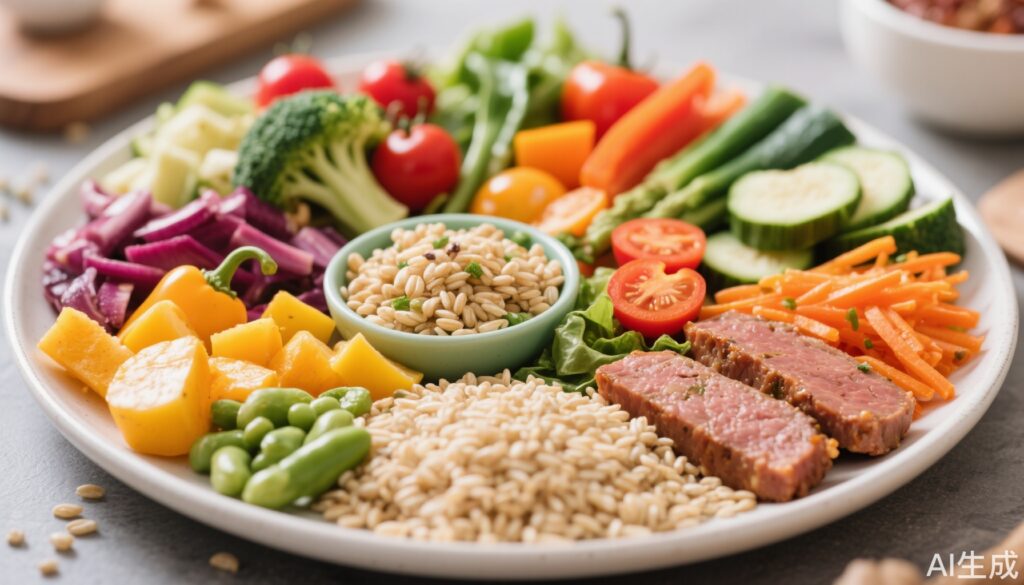Introduction
The conversation around diet has dramatically shifted in recent years, particularly concerning vegetarianism. Traditionally rooted in religious and cultural practices, modern vegetarianism has evolved into a movement driven by health consciousness and ecological awareness. Today’s youth increasingly embrace plant-based diets not just for ethical reasons but to pursue a healthier lifestyle and reduce their environmental footprint. In this article, we’ll explore how vegetarian choices are changing and their nutritional implications, particularly focusing on sources of protein and essential nutrients such as vitamin B12.
The Cultural Shift in Vegetarianism
In the past, vegetarianism was predominantly associated with certain religious groups, such as Hindus and Buddhists. However, the modern vegetarian movement is spearheaded by younger generations who prioritize health and sustainability. According to a recent survey by the Vegetarian Resource Group, the number of vegetarians in the U.S. has risen from 1% in the 1970s to approximately 5% in recent years, with a notable increase in the younger demographic.
This shift can be attributed to several factors: a growing awareness of the health benefits of plant-based diets, the alarming impact of animal agriculture on the environment, and the rise of innovative plant-based food alternatives. In this evolving landscape, vegetarianism is no longer just a diet choice; it has become a lifestyle statement that aligns with health and environmental priorities.
Scientific and Clinical Evidence: What the Data Tell Us
Numerous studies have highlighted the health benefits of a vegetarian diet. A comprehensive review published in the Journal of the American College of Cardiology found that plant-based diets are associated with a lower risk of heart disease, high blood pressure, type 2 diabetes, and certain cancers. Additionally, the American Dietetic Association states that appropriately planned vegetarian diets are healthy, nutritionally adequate, and provide health benefits in the prevention and treatment of certain diseases.
The health benefits can largely be attributed to higher intakes of fruits, vegetables, whole grains, nuts, and seeds, resulting in lower cholesterol levels, better weight management, and improved cardiovascular health. However, with these benefits come specific nutritional challenges that vegetarians must navigate, particularly the intake of protein and vitamin B12.
Understanding Protein Sources in a Vegetarian Diet
One of the most common misconceptions about vegetarian diets is that they lack sufficient protein. However, there are plenty of plant-based sources rich in protein. Here’s a comparative table of high-protein vegetarian foods:
| Food Item | Protein (grams) per 100g |
|——————–|————————–|
| Lentils | 9 |
| Chickpeas | 19 |
| Quinoa | 4.4 |
| Tofu | 8 |
| Tempeh | 19 |
| Peanuts | 25.8 |
| Chia seeds | 17 |
By combining various plant proteins, such as legumes with grains, vegetarians can easily meet their daily protein requirements.
The Role of Vitamin B12 and How to Ensure Adequate Intake
Vitamin B12 is crucial for nerve function, blood cell formation, and DNA synthesis. Unlike other vitamins, B12 is primarily found in animal products, which poses a challenge for strict vegetarians and vegans. A deficiency can lead to serious health issues, including anemia and neurological disorders.
To ensure adequate B12 intake, vegetarians should consider the following options:
– **Fortified Foods**: Many plant milks, breakfast cereals, and nutritional yeast are fortified with B12.
– **Supplements**: B12 supplements are available in various forms (tablets, sublingual, or injections) and can be an effective option for those at risk of deficiency.
Regular blood tests can help monitor B12 levels and ensure that vegetarians are meeting their nutritional needs.
Expert Recommendations: Strategies for a Balanced Vegetarian Diet
To navigate the complexities of vegetarian nutrition, health professionals recommend the following practices:
1. **Diversify Protein Sources**: Incorporate a variety of plant-based proteins, such as beans, lentils, tofu, and nuts, in meals throughout the week.
2. **Focus on Whole Foods**: Prioritize whole foods over processed vegetarian options to ensure an adequate intake of vitamins and minerals.
3. **Consider Nutritional Supplements**: Don’t hesitate to use supplements for nutrients like vitamin B12, particularly if adhering to a strict vegan diet.
4. **Plan Meals**: Adequate meal planning can help ensure that all essential nutrients are included in the diet. Apps are available to help monitor nutrient intake.
5. **Stay Informed**: Consult with a dietitian or nutritionist who specializes in vegetarian diets to develop a tailored nutritional plan.
Conclusion
Modern vegetarianism transcends religious connotations and reflects a burgeoning appreciation for health and environmental stewardship. As more individuals, particularly young people, adopt plant-based diets for their myriad benefits, it is essential to balance nutrition with careful meal planning and awareness of nutrient sources. By focusing on what we eat and making informed choices, we can enjoy the extensive health benefits associated with a vegetarian lifestyle while ensuring our diet remains varied and nutritionally adequate.
References
1. American Dietetic Association. (2009). Position of the American Dietetic Association: Vegetarian Diets.
2. Journal of the American College of Cardiology. (2020). Impact of Plant-Based Diets on Cardiovascular Disease.
3. Vegetarian Resource Group. (2021). U.S. Vegetarian Trends.
4. National Institutes of Health. (2019). Vitamin B12 Fact Sheet.


